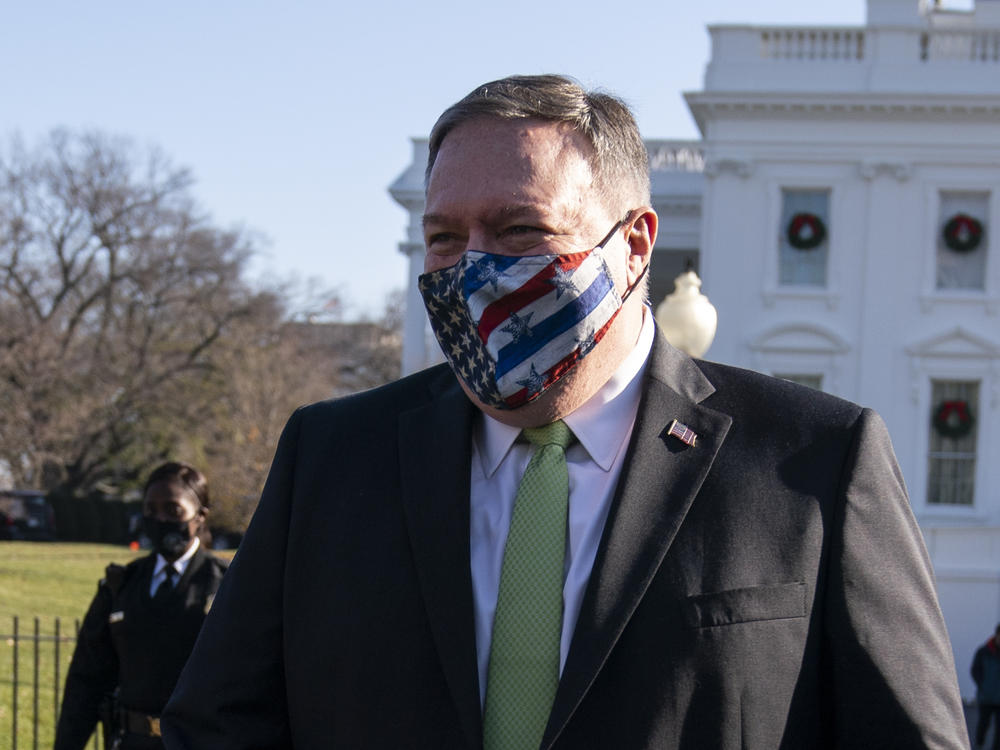Section Branding
Header Content
Voice Of America White House Reporter Reassigned After Questioning Pompeo
Primary Content
Voice of America White House reporter Patsy Widakuswara was reassigned Monday evening just hours after pressing Secretary of State Mike Pompeo on whether he regretted saying there would be a second Trump administration after President-elect Joe Biden's victory was apparent.
Pompeo had appeared at the U.S. government-owned international broadcaster's headquarters in Washington on Monday to make an address. He did not address last week's assault on Congress by a mob filled with President Trump's avowed supporters in his remarks, nor was he asked about it in a congenial question-and-answer session by VOA's new director, Robert R. Reilly. To date, Pompeo, a steadfast Trump ally, has not substantively addressed the attack on the U.S. Capitol at all.
As Pompeo walked out of the VOA building, giving a thumbs up to a man with whom he exchanged remarks in the crowded foyer, Widakuswara lobbed several questions. She asked what he was doing to repair the reputation of the U.S. around the world. She finally asked: "Mr. Secretary, do you regret saying there will be a second Trump administration?" Pompeo did not acknowledge the questions.
She tweeted out videotaped footage of that exchange, which showed a throng of people around. Contemporaneous audio obtained by NPR shows she then turned to press Reilly: "Mr. Director, why did you not ask any of the questions that we wanted to know about?"
He asked who she was, and Widakuswara identified herself as a Voice of America White House reporter. An irate Reilly can be heard saying, "You obviously don't know how to behave," adding, she wasn't "authorized" to be there to ask questions.
Widakuswara: "I know, but I am a journalist, and I am paid to ask questions."
His deputy, Elizabeth Robbins, replied, "We're done here."
Robbins, previously a State Department official under Pompeo, made the request later Monday for Widakuswara to be reassigned away from covering the White House. Through a spokeswoman, Voice of America said it did not comment on personnel matters. A group of anonymous whistleblowers filed a formal complaint last week over Pompeo's visit, saying it was propaganda and that Reilly's intention to broadcast the address over VOA's airwaves was a violation of the newsroom's protections for editorial independence.
The board of the White House Press Association released a statement condemning the Trump administration for shifting Widakuswara off the high-profile beat.
"At a moment when the world already has watched an assault on our democratic institutions, the Trump administration has chosen to send another message, with an assault on the First Amendment," read the statement, released by the group's president, Zeke Miller. "VOA's reassignment of Widakuswara for doing her job, asking questions, is an affront to the very ideals Secretary of State Pompeo discussed in his speech Monday."
In his remarks, Pompeo hailed the role played by VOA and its reporters. He also waded into the clash between the Voice of America and the CEO of its federal parent, the U.S. Agency for Global Media, over how much journalistic independence it has. President Trump's pick as CEO, Michael Pack, has said he is intent on "draining the swamp" of VOA from journalists who, he claims, are biased against the president and emphasizing America's faults to the world through their reports. Pack was present in the foyer for the exchange between the reporter and the Cabinet secretary.
The new VOA director, Reilly, has said the service should tell America's story to the world. Historically, VOA journalists have seen their mission as reflecting American values by reporting freely on political debate and even upheaval here to model how a free press operates and to provide coverage in countries where there is not a robust independent press.
"It is not fake news for you to broadcast that this is the greatest nation in the history of the world and the greatest nation civilization has ever known. I'm not saying this to ignore our faults," Pompeo said in his remarks Monday. "But this isn't the 'Vice of America,' focusing on everything that's wrong with our great nation. It's the 'Voice of America.' It certainly isn't the place to give authoritarian regimes in Beijing or Tehran a platform."
The White House had issued a blistering statement last spring, accusing Voice of America under previous leadership of posting Chinese propaganda on COVID-19 over what turned out to be material from the Associated Press. VOA's then-senior leaders noted numerous stories debunking Chinese claims and offering textured coverage over the coronavirus in that country.
At a morning meeting on Tuesday, VOA journalists told editors they were outraged over Widakuswara's reassignment over asking questions, according to numerous people with direct knowledge.
Disclosure: This story was reported by NPR media correspondent David Folkenflik and edited by NPR Media & Tech editor Emily Kopp. Because of NPR CEO John Lansing's prior role as CEO of the U.S. Agency for Global Media, no senior news executive or corporate executive at NPR reviewed this story before it was published.
Copyright 2021 NPR. To see more, visit https://www.npr.org.

